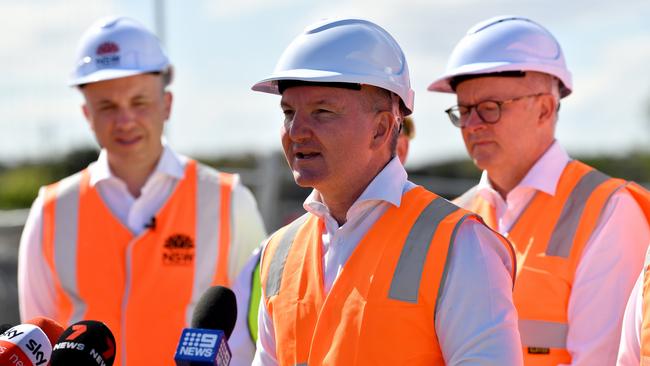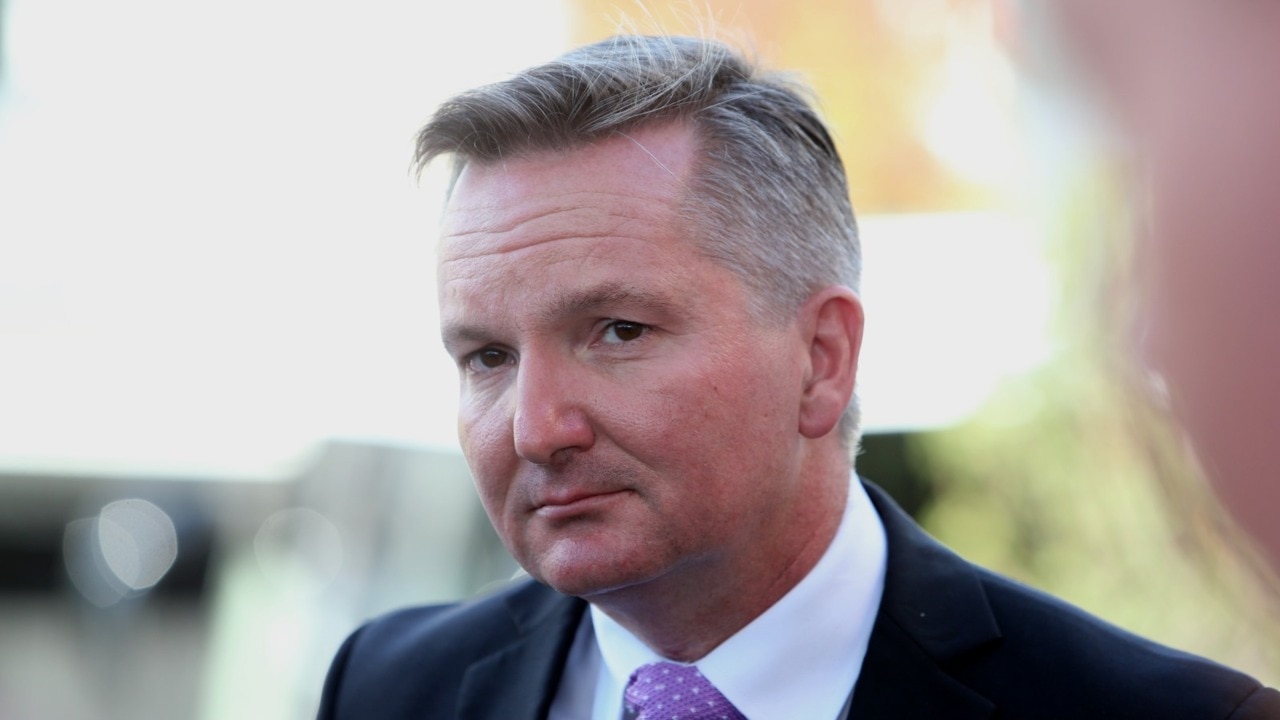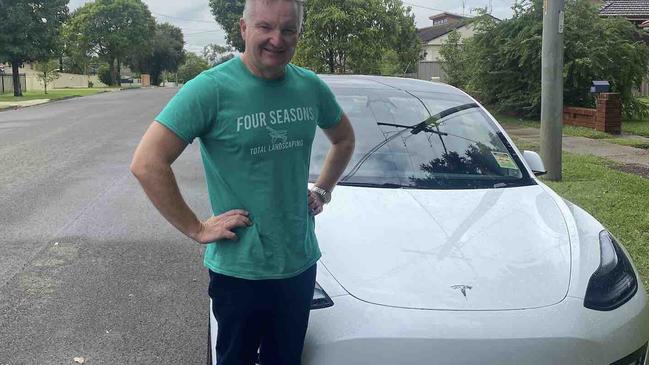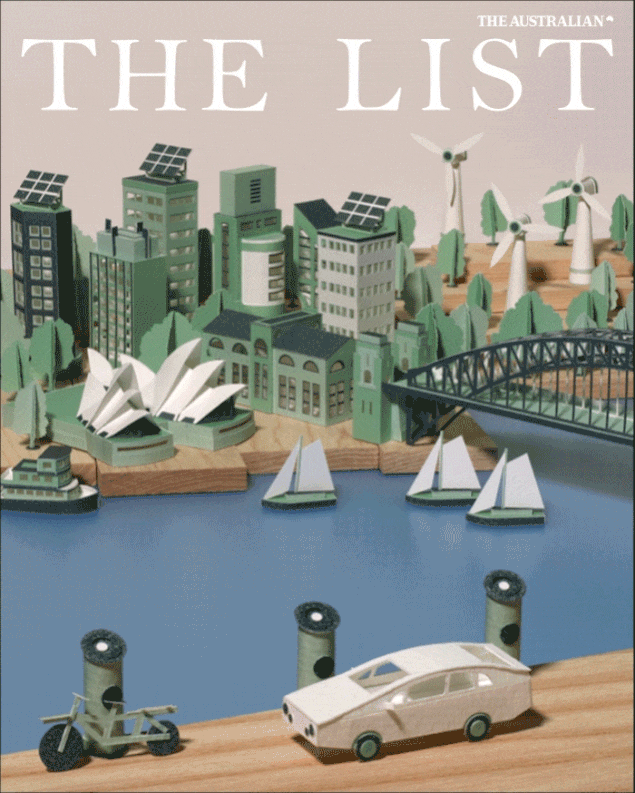Chris Bowen’s laser-like focus for political main game of our time
The ambitious climate minister concedes gas rather than coal will be key in the transition to renewables.

Chris Bowen’s forward-leaning approach to politics, climate change and renewables is driven by a mantra shaped during three decades of career highs and deflating lows:
“You are not going to please all or indeed the majority of people all the time”.
The ambitious Climate Change and Energy Minister, who wants to carve out an intergenerational legacy akin to the 1980s economic reforms of his political hero Paul Keating, isn’t interested in being the popular guy in the room.
The slings and arrows borne over 28 years in politics have added resilience to a character to which his supporters are drawn and his detractors find polarising.
-
Meet the innovators who are leading the transition towards a greener economy in the new edition of The List: Green Power Players, available online and in print on Friday, 24 February.
-
The McMahon MP, representing one of Sydney’s most multicultural electorates, joined the Australian Labor Party in 1988 as a 15-year-old because it “seemed to be the only party that cared”.
Bowen, who as a teenager believed politics was “where the big levers are [and] where the big changes happen”, was elected to Fairfield City Council at 22. He was mayor at 25, a federal MP at 31 and in Kevin Rudd’s shadow ministry at 33. Within three years, at 36, Bowen was sitting around the cabinet table.
The Coalition hounded Bowen, as Assistant Treasurer and Competition Policy and Consumer Affairs Minister, over FuelWatch and GroceryChoice. He shifted into the immigration portfolio at about the same time illegal boat arrivals spiked to record levels. When Rudd ousted Julia Gillard ahead of the 2013 election, Bowen served as Treasurer for less than three months.

“I’m a much better minister this time around. I think I was an alright minister last time, but I’m a better minister now,” says Bowen, reflecting on his rise through the federal Labor ranks.
“Three years as Immigration Minister with free-flowing character assessments every single day. That builds character and resilience, and a hide. There’s nothing anybody can say about me now that is worse than what was said ... when I was Immigration Minister.”
A revitalised Bowen, who considered challenging Anthony Albanese for the leadership following the 2019 election, has maintained a frantic pace since Labor was elected last May. He navigated the east coast electricity crisis, legislated Labor’s 43 per cent 2030 emissions reduction target, joined Joe Biden’s global methane pledge, travelled to COP27 in Egypt, and won crossbench support for the government’s controversial energy price relief plan.
The 50-year-old, who bought a Tesla before the 2022 election to understand the challenges facing the Australian uptake of electric vehicles, has “come to terms with the fact” he can’t please everyone.

“Forty-nine per cent of people will wake up every morning and say, ‘This government’s gone too far on climate – it’s just all too much’. And 49 per cent will say, ‘This government hasn’t gone far enough on climate because they’re not doing enough’. And there will be two per cent in the middle who say ‘I think the balance is about right’,” Bowen says.
While some business and mining executives describe Bowen as a “renewables zealot who is moving too fast”, green energy groups have embraced his laser-like focus on climate targets, replacing coal and gas with solar, wind, hydro and batteries, and getting Australians into EVs as quickly as possible. Like several of his cabinet colleagues, Bowen is a loyal Keating disciple. In question time, he channels the former prime minister with performances described by some colleagues and veteran observers as “hit and miss”.
“You’ve just got to go with your gut ... and work with every morsel of energy you have to communicate what you think is right. And sure, that means I’m a robust communicator in parliament and generally, and that means you attract sort of incoming [criticism]. That’s fine, because we’ve got a robust job to do.”

Bowen, considered Australia’s most progressive climate change minister, has immersed himself in the science and politics of the issue. His climate awakening was an “iterative process”, tracing back to 2004 when he sat in parliament for the first time alongside then Labor MP, conservationist and Midnight Oil frontman Peter Garrett. After Rudd put climate change at the heart of his 2007 election campaign, it was here to stay.
As opposition treasury spokesman between 2013 and 2019, Bowen took an interest in climate change but it wasn’t until he replaced Mark Butler as opposition climate change spokesman in January 2021 that he fully embraced his new mission. Butler, who was under pressure from former Labor MP Joel Fitzgibbon and right-faction powerbrokers on climate policy, had approached the then opposition health spokesman about “changing jobs”. Bowen urged Butler to stay in the role. But privately, he understood climate change was “really the main game … the political challenge of our time”.
“You’ve got to be able to do the big jobs in politics. So why wouldn’t I want to take on the biggest job, in many senses, the most important challenge? Butler, who was copping a lot of incoming [criticism], came to see me and said, ‘Do you think I should get out of this job?’. I said, ‘No, you’re doing a good job. Don’t let the bastards get you down. You should keep going’.”

“I was driving home that night from Canberra and thought, while he shouldn’t feel obliged to leave, if there was a swap … the obvious thing to do would be to swap us. I thought about it a bit and then I had another chat to him and said … ‘I still think you should stay in your job but if you did want to shift, you should’.
“I subsequently heard … that Penny Wong had advised Albo to swap us. But it was all very mutual. He’d done it for eight years, a long time. I was ready for a new challenge.”
Bowen told Albanese that while he was happy to stay in health, “I’m also up for change if it makes sense for you and the team”.
“[Albanese] said ‘Well I think with your economics background, you can win the economic argument for action on climate change’. And I said ‘Well that’s exactly how I’m seeing it’.”
The portfolio swap was the spark Bowen needed.
In the aftermath of the 2019 election loss, Bowen says it wasn’t “easy for a few weeks, or months”.
“It was a blow. We thought we’d win. Most people thought we’d win. But it motivated me. Pick yourself up and fight on,” Bowen says. “At one point, somebody said to me, ‘You seem OK, it’s been a big blow. Why are you OK?’. I said, ‘Two things. One, I choose to be happy. Wake up every morning and decide to be happy. That beats the alternative. Two, it’s not about us. OK, my biggest problem is I’m not the treasurer of Australia. That’s disappointing. But there’s a whole lot of people with a lot bigger problems than that in their lives’.”
Since replacing Butler, Bowen has immersed himself in global climate policies and read 30 books on climate change. Scientist Michael Mann’s The New Climate War was his standout for being “passionate but pragmatic”.
The government’s Powering Australia climate
plan, which includes Labor’s election promise to
slash $275 from household power bills from 2025, relies heavily on lowering transport emissions and forcing the big companies to fast-track the reduction of emissions under a tougher safeguard mechanism.

As car manufacturers accelerate the global EV shift, Bowen says he doesn’t want to force people to have an EV.
“I want everybody to have the choice I’ve been able to make. And they can’t at the moment because we don’t have enough affordable EVs in Australia, and people are worried about charging. Even if they probably wouldn’t travel the distances which mean they need to think about charging often, they do worry about it, and that’s legitimate.”
“I drive to Canberra and back more times than I have hot dinners. I know that’s not the distances somebody in Broken Hill might travel, but still, it’s not around the corner. So I know you can make it work. But I also know what would help make it work better: more chargers along the way.”
Bowen recounts his baptism of fire after the government was confronted with an east coast energy crisis in the weeks following last year’s election.
While Albanese and a handful of ministers were sworn in within days, Bowen had to wait until June 1 to receive formal briefings. On the morning the full ministry was sworn in, his phone started pinging with text messages saying, “Energy markets are in freefall”.
In his first departmental meeting, Bowen postponed the usual incoming brief, telling bureaucrats, “We’ve got a crisis on our hands”. Within a fortnight, as prices soared and supply strained, the Australian Energy Market Operator suspended trading in the National Electricity Market for the first time in history.
“It was pretty tight. I was talking to [AEMO chief executive] Daniel Westerman … and I said, ‘Are we avoiding a blackout tonight?’ and he said, ‘It’s tight minister, but I think we’ll be OK’. When the operator says it’s tight, you know it’s tight.”
“It was pretty tight. I was talking to [AEMO chief executive] Daniel Westerman … and I said, ‘Are we avoiding a blackout tonight?’ and he said, ‘It’s tight minister, but I think we’ll be OK’. When the operator says it’s tight, you know it’s tight.”
The next challenge, brought on by rising inflation and volatile energy prices, was finalising short and long-term fixes for electricity bills and grid reliability.
Following tense negotiations with the states ahead of Christmas, Albanese and Bowen unveiled a one-year plan imposing gas and coal price caps and providing rebates to some households and small businesses. The long-term fix was a post-2025 capacity mechanism, which dictates future investment in the grid and locks in supply for customers. After a five-hour meeting with energy ministers in December, Bowen announced
the mechanism would support dispatchable renewables ahead of coal and gas.
Bowen acknowledges that reducing emissions by 43 per cent before the end of the decade and having 82 per cent renewables in the grid within 84 months is “ambitious”. But with the right policy settings in place, he believes Australians “have shown they’ll take it up”.
“That’s why the capacity mechanism is so important because it only supports dispatchable renewables. Just coming along and saying ‘I’ll build a solar farm’ is not enough to get support out of the capacity mechanism. You’ve got to show we can call on it when we need it. Hence, you need storage.”

Bowen warns that not having enough renewables in place when coal exits the grid is a recipe for disaster.
“We’ve got to be getting it on before [coal exits]. Gas will play a role ... for the foreseeable future. Because the one thing about gas, I don’t regard it as
a low-emissions fuel or a transition fuel, but what I do regard it as is a flexible fuel.”
“Whereas once you turn
a coal-fired power station on,
that baby’s burning for the foreseeable future; you can turn gas on and off for 15 minutes. That’s necessary for peaking and firming with renewables. For the entire grid, having gas there at least as a fallback is important for the foreseeable future.”
Despite his ambition, Bowen wants to stay put “for several terms … to bed down what we need to do. If the Prime Minister came to me tomorrow and said, ‘You know, there’s a chance to do another job’, I’d say, ‘Thanks, boss, but I’m happy doing what I’m doing’.”
“We’ve got a lot more to do. And I hope and intend and expect to be in this job for much more than three years. Yes, we’re accountable to the people in three years’ time for what we’ve done. But I see that as a report back to the people.”
Bowen speaks with scientists, retired bureaucrats and academics for input on “policy conundrums or just general challenges and opportunities” but seeks out Paul Keating for his political advice.
“I still talk to Paul a lot. Obviously, he has strong views about life but you’re never worse off from
a conversation with Paul. Even if you don’t agree
with what he said. [On climate, he says] ‘Mate, this
is the main game. This is the 2020s equivalent to what Bob [Hawke] and I did in the 1980s. You’ve got to
get this right’.”





To join the conversation, please log in. Don't have an account? Register
Join the conversation, you are commenting as Logout